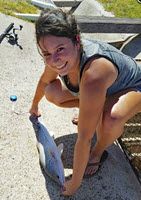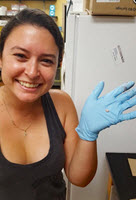
Many fish that were exposed to Deepwater Horizon oil survived; however, they may have experienced later-in-life impacts that affected their ability to survive longer than fish that did not experience oil exposure. Alexis Khursigara investigates if oil-induced latent effects in red drum (Sciaenops ocellatus) alters behavior, particularly the ability to learn and compete with other fish, which are critical to fish survival. Her research addresses hypotheses concerning sublethal effects of oil and may help inform long term population health and fishery management.
Alexis is a Ph.D. student with the University of Texas at Austin’s Marine Science Institute and a GoMRI Scholar with the Relationship of Effects of Cardiac Outcomes in Fish for Validation of Ecological Risk (RECOVER) consortium.
Her Path
Alexis’s parents introduced her to the scientific world at a young age. She spent her childhood summers in her father and step-mother’s neuroscience labs, working with Schwann (neurilemma) cells, helping care for mice and rats, and conducting her own chemical interaction mini-experiments using milk powder and dry ice. Her mother sparked her interest in fish and marine science through trips to the aquarium, where Alexis would spend hours.

Alexis later completed undergraduate and master’s degrees in secondary educational biology at Fairfield University and enrolled in the University of Texas at Austin’s marine science doctoral program. Wanting to focus on how environmental stressors affect fish physiology and behavior, she joined Dr. Andrew Esbaugh’s fish lab researching how oil-induced changes in fish physiology and behavior affect their performance.
“My love for the ocean, fish, and the environment are really what connects me to my research. I love being able to study how human activity impacts our environments and how fish react to those changes,” said Alexis. “I’ve been very fortunate to have parents and people in my life who have always encouraged me to pursue my passions.”
Her Work

Alexis examines the performance of oil-exposed fish compared to control fish as they compete for food and dominance, and conducts long-term group experiments where growth indicates competitive success.
In the one-on-one trials, fish are individually fitted with an elastomer and acclimated in a tank without food for 48 hours. She then observed each fish for 15 minutes, twice a day, for 5 days recording their location in the tank, food acquisition, and interactions such as attacks or avoidance. She also took images of their fins before and after the trials to assess fin damage caused by attacks from other fish. These metrics provided an overall behavior score; the fish with the highest score was deemed dominant while the lower score was the subordinate fish. In group trials, dominance was primarily assessed through specific growth rate (how much a fish grew per day). Fish that obtained more food and had a faster growth rate were considered dominant. In both scenarios, she found that oil-exposed fish tended to be subordinate when there were limited resources.
Alexis is currently conducting week-long fish experiments using a maze with rewards such as food or another fish at the end to understand how oil-induced changes in neurological function may alter fish behavior. She measures fish’s learning ability by observing the amount of time, distance swam, and number of wrong turns each fish takes to reach the reward. She also conducts trials on fish traits such as boldness or sociability to determine changes in a fish’s personality. While these trials are still being conducted, early results indicate that sociability-related behavior changes occur following oil exposure. “While these tests themselves don’t tell us the state of a fish’s neurological function, shifts in performance in these tests can indicate altered function,” explained Alexis. “For example, if oil-exposed fish aren’t able to learn at the same rate as unexposed fish or if a fish demonstrates certain personality traits before exposure that change after exposure, it may indicate some neurological impairment.”

Alexis is currently considering her results in the context of findings from other RECOVER researchers. So far, she has noticed that aerobic scope is an important factor in dominance hierarchies and that fish with a higher aerobic scope (the difference between minimum and maximum oxygen consumption rate) often become dominant. She explained that when oil reduces an individual fish’s aerobic scope, it also reduces their ability to compete in social settings, predisposing them to social subordination. “A major reason for my investigation into personality and learning behaviors came from transcriptomics data run by another group in the consortium,” said Alexis. “They saw that pathways related to neurological and cognitive function were altered following oil exposure, so we’re using personality and learning behaviors to understand how.”
Her Learning
Working in Esbaugh’s lab taught Alexis communication and collaboration skills and introduced her to new techniques that made her a better researcher. Before joining Esbaugh’s team, she felt hesitant about conducting molecular research due to lack of experience and training. However, his encouragement and insistence on learning molecular techniques eventually led her to a project examining oil-exposed and control fish’s gene expression rates of corticoid receptors as indicators of chronic stress. “I spent months trying to design a primer that would work with our species. Finally, after weeks of failure, I finally found primers that worked,” recalled Alexis. “While this was a really big moment for my research, it was also a big moment for me personally. It showed me that if I get past my hesitations about what I can and can’t do, I can open myself up to some really cool things.”
A memorable experience for Alexis was working with her University of Texas community following Hurricane Harvey. Although the storm caused a lot of damage, personal loss, and hard times, she grew closer to others in her lab and her department. She also learned how to recover should another storm hit – a very real possibility when working in coastal facilities. “People were helping others pack up their stuff, getting rid of destroyed belongings, finding new places to live, and replacing lost items,” she said. “We’ve always had a strong sense of community here at the University of Texas Marine Science Institute (UTMSI), but going through something like that made us even closer. I’m incredibly grateful for the leadership and guidance I received not only from my advisor, but the faculty and administration at UTMSI in getting through that difficult time.”
Her Future
Alexis hopes to enter a post-doc position after graduating and find a university position that would allow her to teach and run a research lab. She offered some advice for students considering a career in science: love what you do, build a strong science base, take advantage of any and all resources and opportunities, and, most importantly, have a strong support system.
Praise for Alexis
Dr. Esbaugh described Alexis as a bright and hard-working student who is eager to try new projects and methods and takes constructive criticism well. He praised her contributions to his lab and to the RECOVER consortium, particularly their research direction. “Her project started as an intuitive ecological extension of a well-known oil effect in fish – cardiac impairment – but through her own observation and initiative, it moved into a new and exciting direction,” he said. “She’s been the driving force for an area of research that our entire consortium is embracing. As a student, I could not have asked for more.”
The GoMRI community embraces bright and dedicated students like Alexis Khursigara and their important contributions. The GoMRI Scholars Program recognizes graduate students whose work focuses on GoMRI-funded projects and builds community for the next generation of ocean science professionals. Visit the RECOVER website to learn more about their work.
By Stephanie Ellis and Nilde Maggie Dannreuther. Contact sellis@ngi.msstate.edu for questions or comments.
************
The Gulf of Mexico Research Initiative (GoMRI) is a 10-year independent research program established to study the effect, and the potential associated impact, of hydrocarbon releases on the environment and public health, as well as to develop improved spill mitigation, oil detection, characterization and remediation technologies. An independent and academic 20-member Research Board makes the funding and research direction decisions to ensure the intellectual quality, effectiveness and academic independence of the GoMRI research. All research data, findings and publications will be made publicly available. The program was established through a $500 million financial commitment from BP. For more information, visit https://gulfresearchinitiative.org/.
© Copyright 2010-2018 Gulf of Mexico Research Initiative (GoMRI) – All Rights Reserved. Redistribution is encouraged with acknowledgement to the Gulf of Mexico Research Initiative (GoMRI). Please credit images and/or videos as done in each article. Questions? Contact web-content editor Nilde “Maggie” Dannreuther, Northern Gulf Institute, Mississippi State University (maggied@ngi.msstate.edu).
